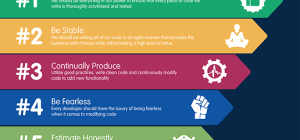In recent years, there has been a significant increase in the demand for Healthcare Customer Relationship Management (CRM) software. Nowadays, medical institutions are actively seeking to develop healthcare CRM systems to deliver cost-effective and user-friendly services. The integration of cutting-edge AI technologies and the advancement of cloud services are expected to benefit small clinics and hospitals through healthcare CRM software.
Nevertheless, the development of a healthcare CRM app is not as simple as it may appear. In addition to incorporating essential features like billing and appointment schedulers, the CRM software must also carefully consider patient privacy and adhere to HIPAA compliance regulations. In this blog, we will delve into a comprehensive, step-by-step guide for creating customized healthcare CRM software. Let’s begin!
A 9-Step Guide to Building a Robust Healthcare CRM System
A well-structured strategy is essential to creating a CRM for hospitals. Here’s how to get started.
Step 1 – Establishing the Project Scope
The first step involves outlining the goals, objectives, and necessities of the healthcare CRM system. Identify the essential functionalities and features required. This includes patient management, appointment scheduling, and seamless integration with existing systems.
Step 2 – Selecting the Optimal Technology Stack
Next, select the suitable tech stack for creating your patient relationship management software. You must take into account key factors like compatibility and the ease of integration with other healthcare systems.
Step 3 – Designing the User Interface and User Experience
The third step involves crafting an intuitive and user-friendly interface catering to both healthcare professionals and patients. You need to develop screens, workflows, and navigation that adhere to industry best practices. This can help ensure a smooth user experience.
Step 4 – Creating the Vital Features
The development phase begins from here on. Commence by developing the essential aspects of the healthcare CRM software. For example, patient registration, electronic health records (EHR), billing, etc. You must give priority to features that are crucial for the optimal functioning of the system.
Step 5 – Enforce Data Security Protocols
Ensuring data security is paramount in healthcare systems. You need to employ strong security measures, such as data encryption and regular data backups. Additionally, while creating a CRM software, you must adhere to HIPAA to protect patient information effectively.
Step 6 – Facilitate Integration with Current Systems
Next, you must integrate the CRM software with various existing systems. An effective integration enhances data exchange capabilities and offers users a comprehensive view of patient information.
Step 7 – Testing and Quality Assurance
This step involves rigorously performing tests and quality assurance to detect and resolve any bugs or vulnerabilities. You need to conduct functional testing, performance testing, and security testing. The idea is to have stable and secure CRM software for your medical institution.
Step 8 – Deployment and Monitoring
Next, launch the medical customer relationship management software in a production environment and monitor its performance. You must observe system usage, data accuracy, and user feedback. This will help you recognize the areas that need improvement and implement updates accordingly.
Step 9 – Maintenance & Support
Ensure regular updates and enhancements to the medical CRM software. Give careful consideration to user feedback, industry trends, and the latest technologies for maintaining a competitive position in the field.
Why Should You Get a Custom Healthcare CRM Software Built?
There are numerous benefits associated with using a customized CRM solution. Read on to learn how it can support your organization.
Patient Records
Understanding the importance of vital treatments, one aspect stands out as crucial – the management of patient records. The significance of a patient’s past medical history cannot be overstated, as it greatly influences every treatment case.
Having access to prior medical records enables doctors to make well-informed decisions about ongoing treatment. To address this need effectively, a CRM system offers a centralized platform, which allows for secure storage and quick access to critical patient information.
By adopting such software, medical institutions can make sure that patient data remains complete and regularly updated. If you want to implement a similar solution for your hospital, you can partner with the top custom healthcare software development company in New York.
Data Security
The vast amounts of private patient data healthcare organizations collect make them highly vulnerable to malware attacks and data breaches. To ensure the utmost security and privacy of user information, you must implement the best HIPAA compliant healthcare CRM software.
With a properly secured CRM system in place, the risk of accidental or intentional data breaches becomes virtually impossible. Implementing these robust safety measures can significantly enhance patient engagement and trust.
Enhanced Marketing Efforts
By providing personalized newsletters and emails on the latest treatments, research, and other relevant topics, a CRM system becomes highly beneficial for patients. When patients are aware that everything is thoughtfully tailored to their specific situation, they tend to respond positively.
With the support of healthcare CRM software, your marketing team can carry out this personalized approach for numerous patients. Developing strong relationships with each of them helps generate 2X leads in turn and fosters a deeper sense of bonding.
Enhanced Efficiency and Productivity
Implementing medical customer relationship software eliminates the need for manual and paper-based processes. This significantly lowers administrative burdens and boosts overall efficiency. You can streamline operations and improve productivity by incorporating features such as task management and automated billing.
Higher Profits and Cost Efficiency
A CRM enhances insurance verification, claims management, and other crucial processes. This leads to better revenue cycle management. You can optimize revenue streams effectively with lower billing errors and faster reimbursements. Additionally, the system’s automation workflows lead to substantial cost savings by minimizing manual labor and administrative costs.
Conclusion
In this blog, readers learned how to develop healthcare CRM software for patients and the benefits of implementing one. Healthcare CRM will continue to reshape the medical industry in good ways.
By adopting a comprehensive development approach and incorporating key features, healthcare providers can leverage the power of technology to deliver exceptional patient experiences. For the best results, they can partner with the top custom software development company located in Dallas, USA.
Top custom healthcare software development company in New York – https://www.unifiedinfotech.net/services/custom-software-development/







